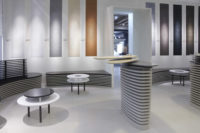Cersaie has always devoted a lot of attention to students and their education, with the show’s September dates coinciding closely with the start of the new academic year after the summer break.
More than 2,500 students from the Emilia Romagna, Tuscany, Marche, Lombardy, Veneto and Liguria regions will be attending this 40th edition of Cersaie, most of them from artistic high schools and technical institutes specializing in subjects relating to Building, Environment and Territory.
By organizing guided visits of the exhibition booths, the show’s organizers aim to give students first-hand experience of the latest developments in the ceramic industry and to offer them additional tools and knowledge to complement the skills they have acquired during their first year of studies.
The Italian ceramic industry is constantly engaged in research and innovation in many different fields including automation, digitalization, R&D, materials chemistry, design, energy and sustainability and always needs highly skilled and qualified professionals.
The traditional visit to Cersaie by students in late September is part of an extensive program of activities of Confindustria Ceramica aimed at strengthening the show’s relationship with schools, training institutes and universities and complementing young people’s education by familiarizing them with the Italian ceramic industry.
This autumn will see the start of the specialization course for a ceramic industry Process and Maintenance Technician, an important figure responsible for supervising the production process and maintaining plants in order to optimize the process. Organized by Nuova Cerform and promoted by Confindustria Ceramica, the course is free of charge for participants as it is funded by the Emilia Romagna regional government.
The third edition of the Master’s degree course in Ceramic Business and Technology will also begin this autumn. The purpose of the course is to train professionals with multidisciplinary expertise in ceramic business and technology and specific skills in the sector’s competitive dynamics and in product and production process management.
The course consists of 320 hours of lectures and approximately 160 hours of company visits and workshops, followed by a 400-hour remunerated internship at a sector company.
The course is intended for Master’s degree graduates who can be taken on by companies as part of an advanced training apprenticeship and continue to work there for the entire duration of the course.






